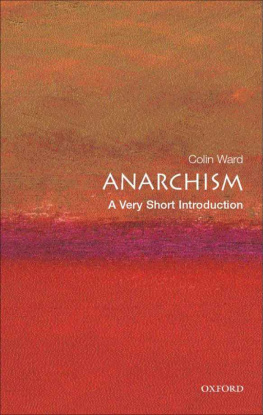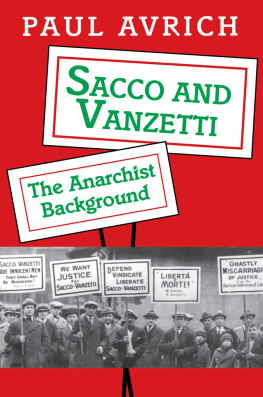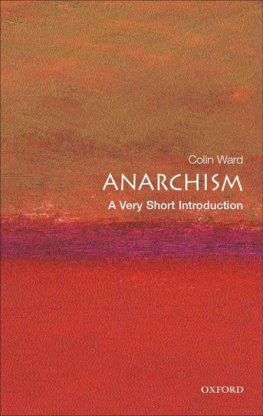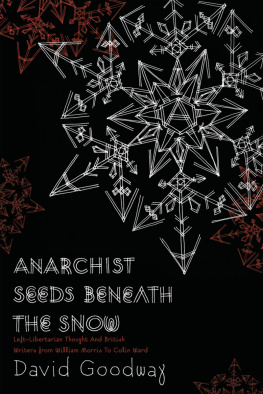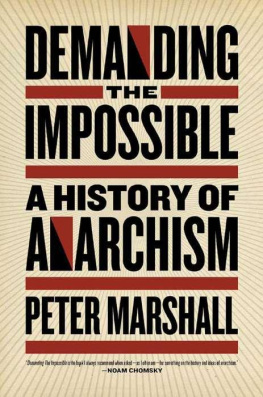
Talking Anarchy
Colin Ward and David Goodway
First published 2003 by Five Leaves Publications
This edition PM Press 2014
All rights reserved. No part of this book may be transmitted by any means without permission in writing from the publisher
PO Box 23912
Oakland, CA 94623
www.pmpress.org
Cover design by John Yates
Layout by Jonathan Rowland
This book has been made possible in part by a generous donation from the Anarchist Archives Project.
ISBN: 978-1-60486-812-8
LCCN: 2013911527
10 9 8 7 6 5 4 3 2 1
Printed in the USA, by the Employee Owners of Thomson-Shore in Dexter, Michigan.
www.thomsonshore.com
Contents
P REFACE
The origins of this book and the way it was compiled are curious and likely to interest its readers, old and new. In April 2001 Colin Ward acceded to the badgering over many years of his friends Amedeo Bertolo and Rossella Di Leo, finally agreeing to be included in the series of book-length interviews their impressive imprint Eluthera was publishing in Milan and to take his place alongside such luminaries of radical culture as Ivan Illich, Paulo Freire, Giancarlo De Carlo, Judith Malina, Enrico Baj, and Evelyn Fox Keller. The format was that the interviewer wrote a substantial introduction about the subject and appeared as the sole of author of the book. Colin asked me to fulfil this role for Conversazioni con Colin Ward, but I didnt want to, being committed to other projects. He persisted saying it would involve me in little or no work! He explained that my essay The Anarchism of Colin Ward, which Id written for his festschrift, Richer Futures: Fashioning a New Politics (edited by Ken Worpole in 1999), could be reprinted unchanged as the introduction. This was definitely encouraging since it implied he approved of its content. Furtherand this was really surprisingI wouldnt need to travel from Yorkshire in the North of England to interview him at his home in East Anglia, because our discussions could be carried out just as well by letter.
And so we began work on the book. I started, I see, by sending him twenty-seven groups of questions, asking him in part about the kind of anarchist he was and his early years and his participation in the Freedom Press Group. The result was the nearest he ever came to autobiography and is the section of Talking Anarchy I consider especially valuable. After this I provided more questions, but just as often he would send answers to questions he had written himself and was also answering. Perhaps he had originally believed the entire interview section could be constructed in this way, but I hung on in terrier fashion, insisting on a significant input if my name was to appear as the interviewer. At the outset he had worked out the minimum length acceptable in Milan: You will see that the Di Carlo book is long and the Freire one short (and in a larger typeface) so they are obviously flexible about length (2 May 2001). When we, particularly he, seemed to have exhausted the obvious topics, we had to work hard to make up the shortfall of words, turning to the section on current events which concludes the book, a real dialogue developing for the first time. Throughout he would type both questions and answers and retype as necessary, cutting and pasting in the old physical sense, with many trips to the photocopier in a local shop. (He was never to word-process or use a computer.)
Our agreed typescript was then dispatched to Amedeo and Rossella, who had a translator on hand to produce the Italian version. Throughout the process, though, I had worked hard to ensure we had a good text since my assumption was that publication in English would follow hard upon the appearance of Conversazioni con Colin Ward. I told Ross Bradshaw, who was reprinting several of Colins works as well as commissioning a new one, about Conversazioni and sent the manuscript, which he read excitedly and said he definitely wanted to publish as a Five Leaves title even before he had fully read it. Colins reaction was perplexing: he would not countenance an English edition in his lifetime. Colin was by then seventy-nine and tried to allay my disappointment, several times, telling me to remember that it wont be all that long when you have to introduce an English version for Ross Bradshaw! (15 March 2003). Yet Rosss response was that he was only interested in bringing the book out while Colin was still alive.
There matters rested for several months. Then, entirely unexpectedly, Colin telephoned to say he was allowing Five Leaves to publish. Why the change of mind? He had just been interviewed by a young researcher and had had some difficulty in recalling things (although in my own experience his long-term memory continued to be as meticulously detailed as ever); and I believe he felt that what Ross was to title Talking Anarchy would be a useful tool to fob off future interviewers.
Ross maintained his enthusiasm for the book, merely criticizing its blandness, commenting on the number of times Colin and I had said I agree. I told Ross I entirely concurred, but that my attempts to stir Colin up and to introduce a little controversy had been overruled and eliminated. An indication of his benign temperament comes (on :
Colin, you are such a generous person, always unwilling to be critical of fellow anarchists. Yet you imply that there are things which divide you from Murray. Is it simply a matter of high theory, of style and changing opinions, all of which you have touched upon, or do you consider more fundamental issues separate your respective, very distinctive conceptions of anarchism?
To which he countered:
It isnt that I am kind or generous. It is simply that I take seriously the business of being an anarchist propagandist. Nothing makes us more ridiculous in the eyes of the world outside than the internal factional disputes some anarchists enjoy pursuing. I try to avoid them.
(For the record, I would observe that I also continue to admire Murray Bookchin greatly.)
Working with Colin on what became Talking Anarchy was an intense but delightful experience. Zach Blue of AK Press was to comment on what a pleasure it must have been to have interviewed him. I broke to it to Zach that we had never met during the process, but was much relieved that the text apparently reads like a genuine interview. It seems easily the work of mine most appreciated by readers. That is of course because it is essentially a book by the great, good and unfailingly lovable Colin Ward.
David Goodway
I NTRODUCTION
Colin Ward is one of the great radical figures of the past half-century, but his impact has been subterranean. His name is little mentioned by commentators and is scarcely known to the wider, intelligent public, even in his native Britain. A striking indication of his intellectual and institutional marginality is that he did not even possess a regular commercial publisher. In Richer Futures: Fashioning a New Politics (1999), a festschrift intended at least in part to remedy this unsatisfactory state of affairs, the editor, Ken Worpole, ably demonstrated the correspondence between Wards concerns and contemporary debates and problems. I suspect that Ward himself would have contended that this linkage can be made because of the commonsensical, realistic, necessary nature of anarchism as such (and not just his especial brand), if people could only see that, and its obvious relevance to the needs of the 21st century; and with this I myself would agree to a considerable extent. But equally there can be no gainsaying the very real originality of his oeuvre.
Next page

